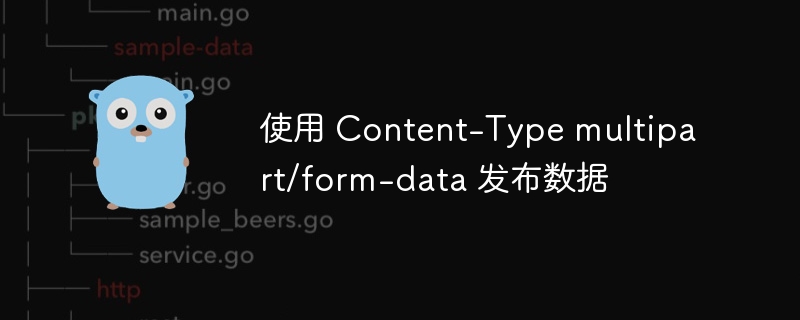Home >Backend Development >Golang >Use Content-Type multipart/form-data to publish data
Use Content-Type multipart/form-data to publish data
- PHPzforward
- 2024-02-14 16:00:101488browse

php editor Strawberry teaches you how to use Content-Type multipart/form-data to publish data. In web development, we often need to upload files or submit form data. This function can be achieved using Content-Type multipart/form-data, which is a commonly used data transmission format. By using this format, we can easily upload and submit files and form data together. This article will introduce in detail how to use Content-Type multipart/form-data to publish data, as well as the precautions for its use. Let’s learn together!
Question content
I'm trying to upload an image from my computer to a website using go. Typically I use a bash script to send the file and key to the server:
curl -F "image"=@"IMAGEFILE" -F "key"="KEY" URL
It's working fine, but I'm trying to convert this request to my golang program.
http://matt.aimonetti.net/posts/2013/07/01/golang-multipart-file-upload-example/
I tried this link and many others, however, for every code I tried, the response from the server was "Image not sent" and I don't know why. If anyone knows what's going on in the above example.
Solution
Here is some sample code.
In short, you need to use the mime/multipart package to build the table.
package main
import (
"bytes"
"fmt"
"io"
"mime/multipart"
"net/http"
"net/http/httptest"
"net/http/httputil"
"os"
"strings"
)
func main() {
var client *http.Client
var remoteURL string
{
//setup a mocked http client.
ts := httptest.NewTLSServer(http.HandlerFunc(func(w http.ResponseWriter, r *http.Request) {
b, err := httputil.DumpRequest(r, true)
if err != nil {
panic(err)
}
fmt.Printf("%s", b)
}))
defer ts.Close()
client = ts.Client()
remoteURL = ts.URL
}
//prepare the reader instances to encode
values := map[string]io.Reader{
"file": mustOpen("main.go"), // lets assume its this file
"other": strings.NewReader("hello world!"),
}
err := Upload(client, remoteURL, values)
if err != nil {
panic(err)
}
}
func Upload(client *http.Client, url string, values map[string]io.Reader) (err error) {
// Prepare a form that you will submit to that URL.
var b bytes.Buffer
w := multipart.NewWriter(&b)
for key, r := range values {
var fw io.Writer
if x, ok := r.(io.Closer); ok {
defer x.Close()
}
// Add an image file
if x, ok := r.(*os.File); ok {
if fw, err = w.CreateFormFile(key, x.Name()); err != nil {
return
}
} else {
// Add other fields
if fw, err = w.CreateFormField(key); err != nil {
return
}
}
if _, err = io.Copy(fw, r); err != nil {
return err
}
}
// Don't forget to close the multipart writer.
// If you don't close it, your request will be missing the terminating boundary.
w.Close()
// Now that you have a form, you can submit it to your handler.
req, err := http.NewRequest("POST", url, &b)
if err != nil {
return
}
// Don't forget to set the content type, this will contain the boundary.
req.Header.Set("Content-Type", w.FormDataContentType())
// Submit the request
res, err := client.Do(req)
if err != nil {
return
}
// Check the response
if res.StatusCode != http.StatusOK {
err = fmt.Errorf("bad status: %s", res.Status)
}
return
}
func mustOpen(f string) *os.File {
r, err := os.Open(f)
if err != nil {
panic(err)
}
return r
}The above is the detailed content of Use Content-Type multipart/form-data to publish data. For more information, please follow other related articles on the PHP Chinese website!

